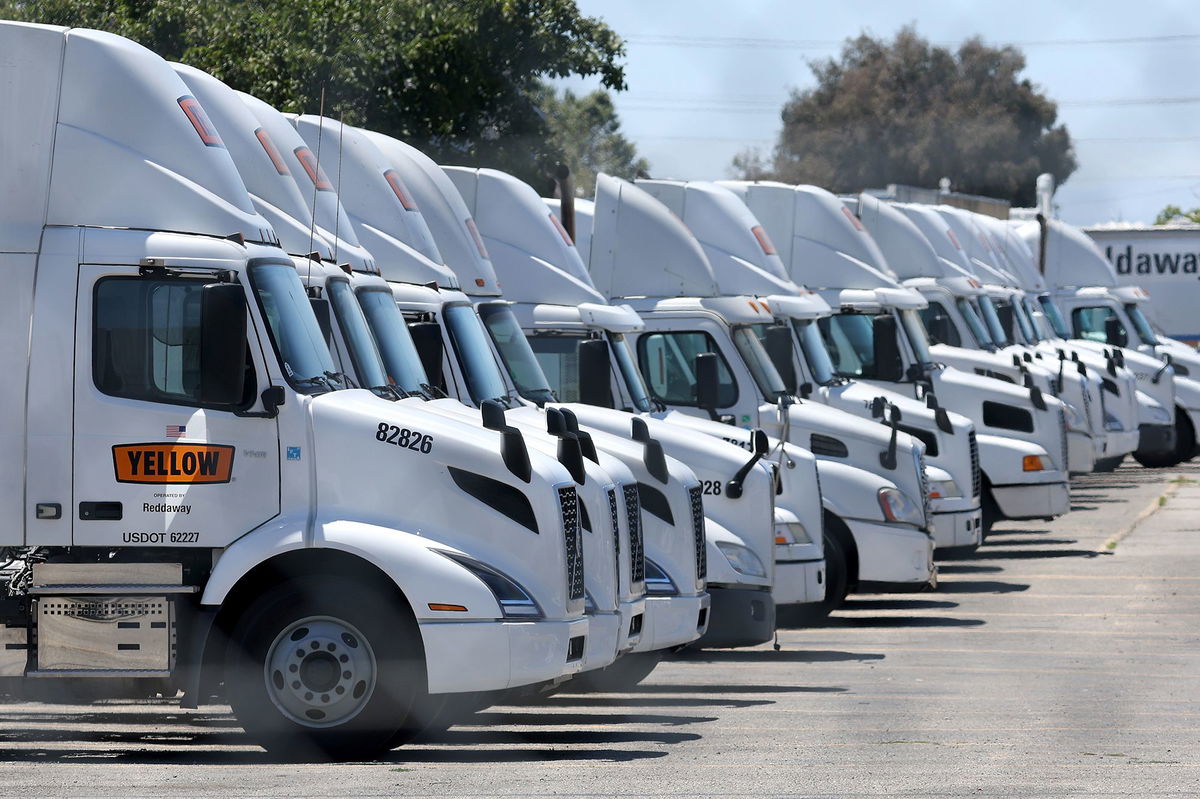Laid-off Yellow drivers will have a tough time finding good jobs

Yellow Corp. trucks sit idle at a company facility on Monday after the Teamsters union said the company has closed operations.
By Chris Isidore, CNN
New York (CNN) — Since Sunday, Mark Roper, a truck driver for 32 years, has been out of a job, along with 30,000 of his fellow workers at now-defunct transportation company Yellow.
Roper, who turns 59 in October, said he’s not ready to retire and has already started applying for jobs elsewhere. But the kind of trucking job he had at one of Yellow’s regional carriers — the kind that lets him see his family every night — is difficult to find in the trucking business, far less common than the jobs that keep drivers on the road for weeks at a time, moving full trailers of freight.
Roper said the company hasn’t told him anything about severance. He’s worked 28 years at Holland Freight, which Yellow bought in 2005.
“I figure that my severance is the unemployment I just filed for,” he told CNN. “But they’re not telling us anything.”
Roper has already started applying for jobs at other unionized trucking companies, including part-time work at UPS and driving jobs at ABF Freight and TForce. But there are some companies he’d rather not apply at.
The difference is in the particular sector of the trucking industry. Yellow, ABF and TForce all are what’s known as LTL, or less-than-truckload carriers. They handle pallet-sized shipments of freight through a network of terminals. As a result, drivers are on specific routes during the day, and most get home every night, as Roper has done.
But that’s only a sliver of the industry.
Sleeping in cabs, showering at truck stops
Truckload carriers, which move full trailers of freight, make up a sector at least five times as large as the LTL part of the business. Almost all companies in the truckload sector are hiring, if only due to annual driver turnover that averages between 55% to 60% and can reach as high as 100%, according to Satish Jindel, a trucking industry consultant.
That’s partly because truckload drivers are often on the road for weeks at a time, moving one trailer full of freight from point A to point B, then picking up the next load at a nearby point C to take to a point D, and on and on. Drivers will typically sleep in beds that are in the back of their cabs and shower – when they can – at truck stops.
In contrast, less-than-truckload carriers have relatively low driver turnover, an average of 18% to 20%, according to Jindel, which means those jobs, already less numerous than truckload jobs, are open far more rarely.
The grueling life away from home is why Roper would prefer to stay away from that segment of the industry, though he said he’ll take the job there if it comes to that.
“I don’t want to be away from my family. The family means more to me than anything, especially recently. I lost my mother and stepfather to Covid and my father earlier this year,” he said.
Raising a family on a trucking job
Trucking overall has slowed in the past year. In 2021, with limited opportunities for travel and social gatherings, Americans were spending money on goods, not services, to help fill the void. And virtually every item in a home was on a truck at some point before it was purchased.
But with opportunities for social experiences opening back up, shopping for goods that need to be moved by truck has slowed, hitting the trucking industry. LTL shipments fell 17% between 2021 and 2022 and another 5% in the first quarter compared to the first quarter a year earlier, according to Tom Nightingale, CEO of AFS Logistics, a third-party logistics firm that places about $11 billion worth of freight annually with different trucking companies on behalf of shippers.
Yellow did not respond to CNN questions about what it plans to do for its workers or when it might file for bankruptcy. The company has blamed its problems on an inability to reach a new labor deal with the Teamsters union, which represented 22,000 workers at Yellow, including Roper. The union says the problem was mismanagement by Yellow’s corporate leaders and that the union had granted billions of dollars worth of concessions to Yellow in an effort to keep the company alive.
Roper’s trucking job, which he said has paid him about $78,000 to $80,000 a year in recent years, helped him raise a family of six children ranging in age from a 37-year-old disabled son to a 12-year-old son who is still at home. He has an 18-year-old daughter about to start college later this month. He said he’s already gotten some positive response from some of the LTL carriers he’s applied to, so he’s hopeful.
But if that doesn’t work out, he said, he’ll consider looking at jobs in the truckload sector.
“I’m the type of person who will do whatever I need to do for my family,” he said.
The-CNN-Wire
™ & © 2023 Cable News Network, Inc., a Warner Bros. Discovery Company. All rights reserved.